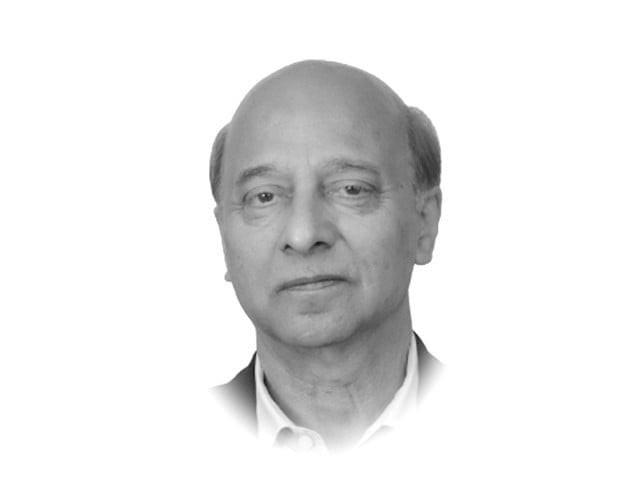Exceptionalism versus state credibility
Rhetoric on the rule of law becomes meaningless when protectors of state lands ally with lawbreakers and land grabbers

The literally en mass convictions (related to the May 9, 2023 protests) on account of terrorism and the resultant disqualifications of several PTI stalwarts including Omar Ayub, Shibli Faraz, Senator Ejaz Chaudhry, MNA Muhammad Ahmad Chattha and Punjab Assembly opposition leader Ahmad Khan Bhachar by the Election Commission of Pakistan (ECP) exemplify a new brand of exceptionalism.
Exceptionalism is a term often associated with the policies of the United States and its European allies in defending their interests, regardless of logic or morality. However, Pakistan has also been experiencing exceptionalism of a different kind in recent years.
The ongoing terrorism in Balochistan and Khyber-Pakhtunkhwa provinces, the state's narrative against violence and the disqualification of PTI MPs suggest exceptional approaches. Are these routine occurrences or consequences of Pakistan's exceptionalism in recent years?
Ayub, Faraz, Chaudhry, Chattha and Bhachar were sentenced to 10 years in prison each under anti-terrorism charges related to the May 9 protests and riots. Their convictions were not surprising.
Similarly, an opposition MP in the Punjab Assembly, Rana Shahbaz Ahmad, recently questioned the institution of multiple cases against him under the Anti-Terrorism Act. While holding the Holy Quran, he asked other MPs if he looked like a terrorist.
This context fits the term exceptionalism, which denotes selective application of laws, subversion of regulations for expedience and socio-political discrimination in favour of certain groups.
This approach distorts governance, stunts the rule of law and raises questions about the conduct of state institutions, which often claim to uphold the rule of law and justice for all but engage in actions that contradict their exhortations to the public.
Exceptionalism undermines the state's integrity and authority by discrediting narratives against non-state actors. While certain segments face state-sponsored wrath and attacks on rights, the official advocacy for justice, equality and expectation of loyalty to the state loses credibility.
Rhetoric on the rule of law becomes meaningless when protectors of state lands ally with lawbreakers and land grabbers. Citizens doubt the rule of law when state institutions turn a blind eye to political, non-political or religious groups intruding on public spaces, occupying green areas and disregarding laws. When religio-political groups are seen as tools for power politics, the state loses credibility. Can the rule of law thrive without action against anti-state elements?
If the status quo persists and short-sighted policies continue, threats from within will also persist. State institutions use parties and individuals as socio-political crutches, disregarding the fact that most hosts (mosque/madrassas) and their guests (often militants/insurgents of different shades) are actually ideological partners. Many mosques and madrassas run by factions of mainstream parties serve as conduits and shelters for proxy terrorists but state institutions can't dare check them out.
Such duplicity and inaction — a kind of exceptionalism vis a vis certain groups — also drain investors' confidence and casts doubt on the intent against terrorist groups. Even China's strategic patience in economic engagement can wear thin if Pakistani leaders continued the path of ambiguity as far as order and justice is concerned.
Certainty of punishment is the primary reason for lower crime rates in countries like China, Iran, Central Asian Republics and Middle Eastern countries. Quick institutional responses and certainty of punishment deter such crimes.
Until state institutions showcase exemplary case settlement through efficient policing, quick prosecution and a justice-focused judiciary, law-breaking will increase without fear of punishment. Until the state demonstrates indiscriminate justice to all law-breakers, crime will thrive, damaging the integrity of the rule of law narratives.
Narrative is abstract, but its outcomes - indiscriminate due process of justice — are not. When people see the state's top brass indulge in expedient actions that run contrary to the notion of rule of law, they stop trusting the state.
Compassion, favouritism and expedience subvert law and weaken public belief in it. Common people will believe only when justice is served to victims, and violators are punished. A people-centric rights-based advocacy campaign should accompany strict punishment. Indiscriminate commitment to and execution of the rule of law facilitates state narratives on rights and justice. Exceptionalism undermines state narratives against subversive groups or non-state actors. The civil and military leadership may peddle the anti-terrorism notions or scream day and night about their commitment to the rule of law, yet not many would accord any credence as long as people at large view that rhetoric being at variance with actions on ground.
The most current example of exceptionalism's bitter outcomes is the genocide of the Palestinians at the hands of Israelis who are willfully starving tens of thousands of besieged, helpless Gazans, including women and children. Few people across the globe trust the sympathetic statements that ring out of major capitals because people at large view them as Israel-abettors.
Similarly, exceptionalism is accruing huge credibility costs to the Pakistani society too. The sooner this approach ends the better it may be for the integrity and credibility of the state institutions. The latest round of convictions will only further erode the state credibility and deepen the wedge between the people and the state.














COMMENTS
Comments are moderated and generally will be posted if they are on-topic and not abusive.
For more information, please see our Comments FAQ